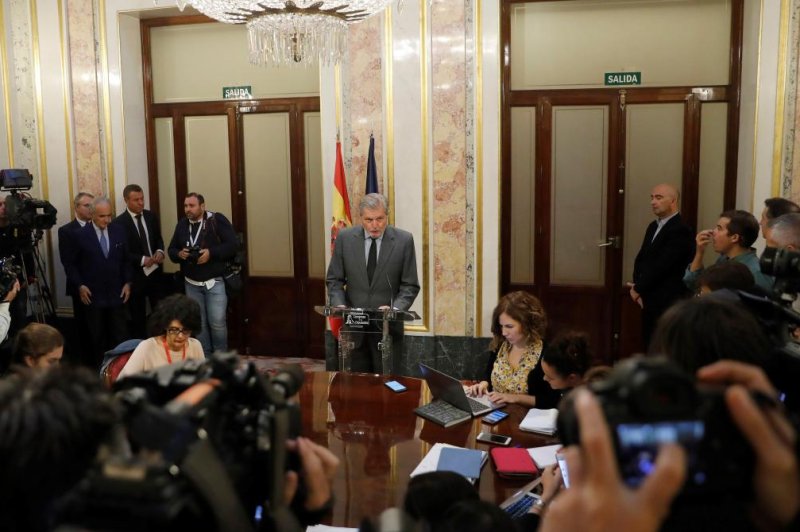A Spanish government spokesman announces that the Madrid government will move to invoke Article 155 of the Spanish Constitution amid the independence crisis involving Catalonia. Photo by Juan Carlos Hida/EPA
Oct. 19 (UPI) -- Spain's government said Thursday it will move to impose direct rule over Catalonia -- an unprecedented action -- after the region's president refused to abandon independence push.
The announcement came after Catalan President Carles Puigdemont said in a letter to Spanish Prime Minister Mariano Rajoy that discussions were the only way to resolve the crisis, and threatened a unilateral declaration of independence if Madrid refused to negotiate.
"If the Spanish government persists in hindering dialogue and continues with its repression, the Catalan parliament could, if it deems appropriate, proceed to vote on the formal declaration of independence," the Catalan leader said.
Puigdemont faced a Thursday deadline to clarify his intentions and abandon the autonomous region's independence push.
Spain's government reacted by saying it would invoke Article 155 of the constitution, which allows Madrid to suspend Catalonia's autonomy, impose direct rule and call for new elections in a crisis.
"At an emergency meeting on Saturday, the cabinet will approve measures to be put before the Senate to protect the general interest of Spaniards, including the citizens of Catalonia, and to restore constitutional order in the autonomous community," a spokesperson for the Spanish government said Thursday.
"We have envisaged a range of scenarios and will apply 155 accordingly," the spokesperson added. "It's not a question of applying it in its entirety or of taking over every government function or department. Clearly, the Catalan government would lose many of its powers, though not all. It's a case of using a scalpel, not an axe."
A spokesman for Spain's Popular Group in the Senate also said, "the rule of law cannot admit blackmail."
The Catalan referendum vote, held Oct. 1, favored a push for independence. However, the Catalan president hasn't responded to Rajoy's requests to clarify his region's plan for independence, instead opting to ask for more dialogue between the governments.
The Spanish government has called the referendum vote illegal.
"Puigdemont has reached a point where he has broken this framework of coexistence and has placed it in a frankly complex and difficult situation," the Popular Group spokesman said.















